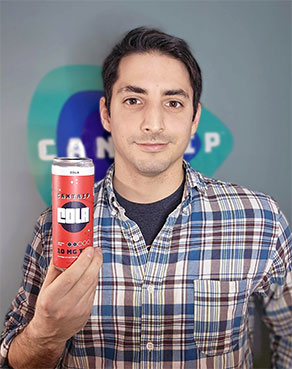Whether it’s residents who don’t want marijuana sold in their towns or dispensaries who want the sales all to themselves, there always seems to be this push to remove or restrict cannabis. Until marijuana is federally legalized, each state is left to develop their own varying rules and regulations.
Cantrip co-founder and CEO Adam Terry shared with Cannabis Regulator about one particular battle his company is facing against state dispensaries.
A Push to Ban the Sale of Hemp-derived Intoxicants

In Massachusetts, where Terry is based, there has been an intense PR campaign to ban hemp intoxicating cannabinoids in the state — largely funded by “a handful of dispensaries who think it’s unfair for these products to be sold, but are masking it as a safety issue,” according to Terry.
“From my perspective, hemp-derived beverages are usually much safer than dispensary-made beverages,” he continues. “There is no intrinsic value to a dispensary license that endows the holder with the extensive knowledge of quality control necessary to make a high-quality beverage, and in fact, there’s no regulation by the CCC on how any edible product is made other than dosing, labeling, testing and packaging.”
Edibles and beverages are tested for the same contaminants that flower and concentrates are, according to Terry, but beverages are susceptible to many different pathogens that flower and concentrates are not. In addition, most hemp-derived THC beverages are tested to the same standards as any adult-use cannabis program.
Dispensaries Hoarding All the Sales
Terry mentions that beverages make up a measly 1-2% of most dispensary sales, which means this debate is more about dispensaries being upset at the possibility of not owning the whole market.
“At the end of the day, the bad PR is being pushed by a couple of specific players who want to use d8-THC (which is already banned in MA) and a handful of clearly bad actors (gas station gummies with clearly ripped-off brands) in order to paint the whole hemp channel in a negative light to ensure that the licenses they acquired have maximum value,” explains Terry. “As usual, it is about money for them, not consumer safety or accessibility.”
Since Cantrip contains less than 0.3% d9-THC on a dry weight basis and is created from hemp, it’s sold wherever it’s permitted by state law. Fortunately, Massachusetts is not a top-selling state for the brand, so this push to ban hemp intoxicating cannabinoid has not impacted business tremendously. But it has caused Terry to pause investing in state hemp channels.
“As a resident and constituent, I certainly am looking to my lawmakers to write some commonsense policy here, starting with passing H90, which would allow cannabinoids in food products, including CBD — which is currently not allowed,” Terry says. “H90 would also help the dying hemp industry in the state.”
Attempting to Restrict the Access of THC Outside of Dispensaries
Amidst this debate, certain groups are also attempting to restrict access to THC outside of dispensaries. According to Terry, this once again comes down to money. Which is understandable, since it can take someone years to get a dispensary up and running, but they want this THC prohibition to continue in a way that is specifically financially advantageous for them and for no one else.
“We have created a prohibition-light model for cannabis that favors the very wealthy in establishing markets,” explains Terry. “As much as we talk about social equity as an industry, it has been nearly impossible to achieve because we force extremely onerous regulations when they fail to thrive.”
Most of the successful players in Massachusetts are legacy, vertically integrated operators owned by affluent men, according to Terry, while smaller mom-and-pop shops struggle to exist.
“Large MSOs order products from small manufacturers and then don’t pay for 90-120 days, hoping that the supplier simply goes out of business so they don’t have to pay,” Terry says. “There are far more small businesses thriving in hemp than in regulated adult-use marijuana because it is simply unaffordable to bootstrap your way into regulated adult-use marijuana. We have created a system that works for very few but is incredibly lucrative.”










